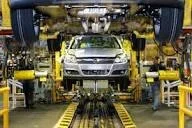L
LequteMan
Guest
According to the Federal government of Nigeria, the ongoing implementation of the Nigerian Automotive Industry Development Plan (NAIDP) is taking its course, and there is no intention to reverse, or alter any aspects of the process.
The Director-General, National Automotive Council (NAC), Aminu Jalal, said that government has not reneged on its promise to shift the implementation process of certain aspects of the NAIDP till January 2015 as is being alleged, noting that the application of the levy exemption was only being misinterpreted, THE NATION reports.
“The government has already shifted the implementation of the full tariff on new vehicles from January 10, 2014 to July 1, 2014 to enable importers clear vehicles they had ordered at the old duty rates. The government only extended the concession on the importation of used vehicles only by another six months till December 31.
He said this step was taken “because up to three out of four imported cars are used, and time needs to be given to the assembly plants to produce affordable vehicles to replace the imported used ones. Unfortunately, this levy on new cars was misinterpreted to mean that all vehicles, including new FBU imports were exempt from levies until December 31.”
Jalal stressed that this could not have been the case, because existing and new entrants into the assembling process under the NAIDP, have started to roll out new products at competitive rates. He explained that as a result of continuous inflow of new Fully Built Units (FBUs) without restriction occasioned by this misinterpretation, assemblers began to cut down on orders for assembly kits and this has the potential to derail the policy.
“The response to the policy by investors has exceeded our expectations. The existing assembly plants have a new lease of life, with VON assembling the Nissan and Hyundai vehicles, and PAN resuming assembly of Peugeot cars. INNOSON will soon start car assembly to complement his commercial vehicles production.
“Twenty-two companies have indicated interest to assemble vehicles and four will start assembly operations before the end of this year, and the rest next year. The implementation of the policy is now focusing on local content development. “
Jalal said the objective of the automotive policy was to bring back vehicle assembly in Nigeria and develop automotive content to supply the assembly plants.
“This is because of the importance of the industry in employment generation, GDP contribution, technology acquisition, SME development, skills development and technology acquisition,” he noted.
#Nigeria

The Director-General, National Automotive Council (NAC), Aminu Jalal, said that government has not reneged on its promise to shift the implementation process of certain aspects of the NAIDP till January 2015 as is being alleged, noting that the application of the levy exemption was only being misinterpreted, THE NATION reports.
“The government has already shifted the implementation of the full tariff on new vehicles from January 10, 2014 to July 1, 2014 to enable importers clear vehicles they had ordered at the old duty rates. The government only extended the concession on the importation of used vehicles only by another six months till December 31.
He said this step was taken “because up to three out of four imported cars are used, and time needs to be given to the assembly plants to produce affordable vehicles to replace the imported used ones. Unfortunately, this levy on new cars was misinterpreted to mean that all vehicles, including new FBU imports were exempt from levies until December 31.”
Jalal stressed that this could not have been the case, because existing and new entrants into the assembling process under the NAIDP, have started to roll out new products at competitive rates. He explained that as a result of continuous inflow of new Fully Built Units (FBUs) without restriction occasioned by this misinterpretation, assemblers began to cut down on orders for assembly kits and this has the potential to derail the policy.
“The response to the policy by investors has exceeded our expectations. The existing assembly plants have a new lease of life, with VON assembling the Nissan and Hyundai vehicles, and PAN resuming assembly of Peugeot cars. INNOSON will soon start car assembly to complement his commercial vehicles production.
“Twenty-two companies have indicated interest to assemble vehicles and four will start assembly operations before the end of this year, and the rest next year. The implementation of the policy is now focusing on local content development. “
Jalal said the objective of the automotive policy was to bring back vehicle assembly in Nigeria and develop automotive content to supply the assembly plants.
“This is because of the importance of the industry in employment generation, GDP contribution, technology acquisition, SME development, skills development and technology acquisition,” he noted.
#Nigeria



